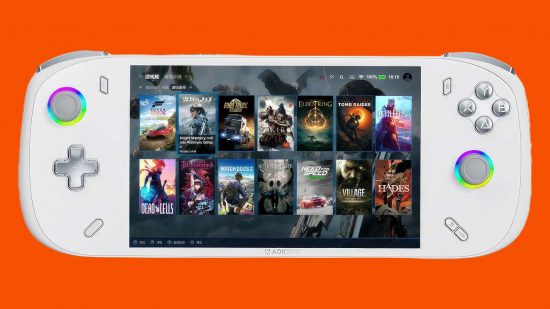The MSI Claw turned heads upon its reveal, given that it was the first mainstream Intel-powered handheld gaming PC. Now that it’s out in the wild, the reception has been frosty, but many are putting this down to poor optimization. Now, the AOKZOE A2 Ultra will show us who was truly at fault for the early failures of the Claw A1M.
With specs that should see it become one of the best handheld gaming PCs, the AOKZOE A2 Ultra has been touted for a while now, but it’s confirmed to be powered by the Intel Core Ultra 7 155H. This is the same chip powering the higher-spec models of the MSI Claw A1M, which was released to largely negative reception.
| AOKZOE A2 Ultra specs | |
| CPU | Intel Core Ultra 7 155H |
| GPU | Intel Arc (8 Xe cores) |
| RAM | Up to 64GB LPDDR5X-7,467MHz |
| Storage | PCIe 4.0 NVMe M.2 SSD |
| Display | 7.0-inch (1920 x 1080) |
| Battery | 12,600mAH |
| Weight | 666g |
| Dimensions (L x W x H) | 26.5 x 10.5 x 2.2cm |
| OS | Windows 11 |
AOKZOE is no stranger to the handheld market, but it has typically followed the example of other handhelds like the Steam Deck and ROG Ally, by using AMD Ryzen APUs. This makes the move to Intel all the more intriguing.
It’s always nice to see competition in a market, as it reduces the risk of the dominating manufacturer resting on its laurels and turning out half-baked products. However, Intel’s early attempts at breaking into the handheld gaming PC market have been far from smooth thus far.
The MSI Claw was positioned to send shockwaves across the handheld space, and it did just that, but in the worst way possible. There are no two ways about it, the MSI Claw is a mess right now.
It’s unoptimized and seems to struggle with even basic gaming tasks that the likes of the Steam Deck can perform without breaking a sweat. Time will tell whether this is down to the architectural limitations of Intel’s processors or whether MSI is to blame for the Claw’s failure.
If you are keeping a close eye on the handheld scene, we’ve recently discussed how some of 2024’s big releases are struggling on Steam Deck, and what that could mean when we look to the next generation of devices.
